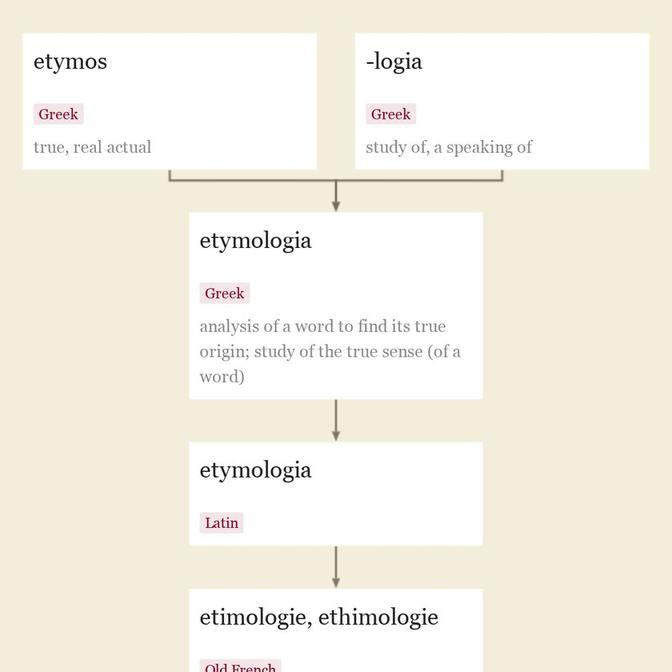Entries linking to etymologize
late 14c., ethimolegia "facts of the origin and development of a word," from Old French etimologie, ethimologie (14c., Modern French étymologie), from Latin etymologia, from Greek etymologia "analysis of a word to find its true origin," properly "study of the true sense (of a word)," with -logia "study of, a speaking of" (see -logy) + etymon "true sense, original meaning," neuter of etymos "true, real, actual," related to eteos "true," which perhaps is cognate with Sanskrit satyah, Gothic sunjis, Old English soð "true," from a PIE *set- "be stable." Latinized by Cicero as veriloquium.
In classical times, with reference to meanings; later, to histories. Classical etymologists, Christian and pagan, based their explanations on allegory and guesswork, lacking historical records as well as the scientific method to analyze them, and the discipline fell into disrepute that lasted a millennium. Flaubert ["Dictionary of Received Ideas"] wrote that the general view was that etymology was "the easiest thing in the world with the help of Latin and a little ingenuity."
As a modern branch of linguistic science treating of the origin and evolution of words, from 1640s. As "an account of the particular history of a word" from mid-15c.
As practised by Socrates in the Cratylus, etymology involves a claim about the underlying semantic content of the name, what it really means or indicates. This content is taken to have been put there by the ancient namegivers: giving an etymology is thus a matter of unwrapping or decoding a name to find the message the namegivers have placed inside. [Rachel Barney, "Socrates Agonistes: The Case of the Cratylus Etymologies," in "Oxford Studies in Ancient Philosophy," vol. xvi, 1998]
By late-14c. a sense had developed of "conjugation and categorization of words," apparently from a misunderstanding of etymology as dealing in tenses, and it is listed with prosody, orthography and syntax as an element of grammar:
...for the beginners of any language whatsoever, [etymologie] is so necessarie, that without it, they could not understand or learne it: The which by the Latin Grammarians hath beene, and is called Declension and Coniugation. [John Minsheu, "A Spanish Grammar," 1599.]
OED considers this sense to be "now historical." Related: Etymological; etymologically.
word-forming element used to make verbs, Middle English -isen, from Old French -iser/-izer, from Late Latin -izare, from Greek -izein, a verb-forming element denoting the doing of the noun or adjective to which it is attached.
The variation of -ize and -ise began in Old French and Middle English, perhaps aided by a few words (such as surprise, see below) where the ending is French or Latin, not Greek. With the classical revival, English partially reverted to the correct Greek -z- spelling from late 16c. But the 1694 edition of the authoritative French Academy dictionary standardized the spellings as -s-, which influenced English.
In Britain, despite the opposition to it (at least formerly) of OED, Encyclopaedia Britannica, the Times of London, and Fowler, -ise remains dominant. Fowler thinks this is to avoid the difficulty of remembering the short list of common words not from Greek which must be spelled with an -s- (such as advertise, devise, surprise). American English has always favored -ize. The spelling variation involves about 200 English verbs.
Trends of etymologize
More to Explore
updated on September 28, 2017
Trending words
Dictionary entries near etymologize
etude
etui
etymological
etymologicon
etymologist
etymologize
etymology
etymon
eu-
*eu-
eubacteria

